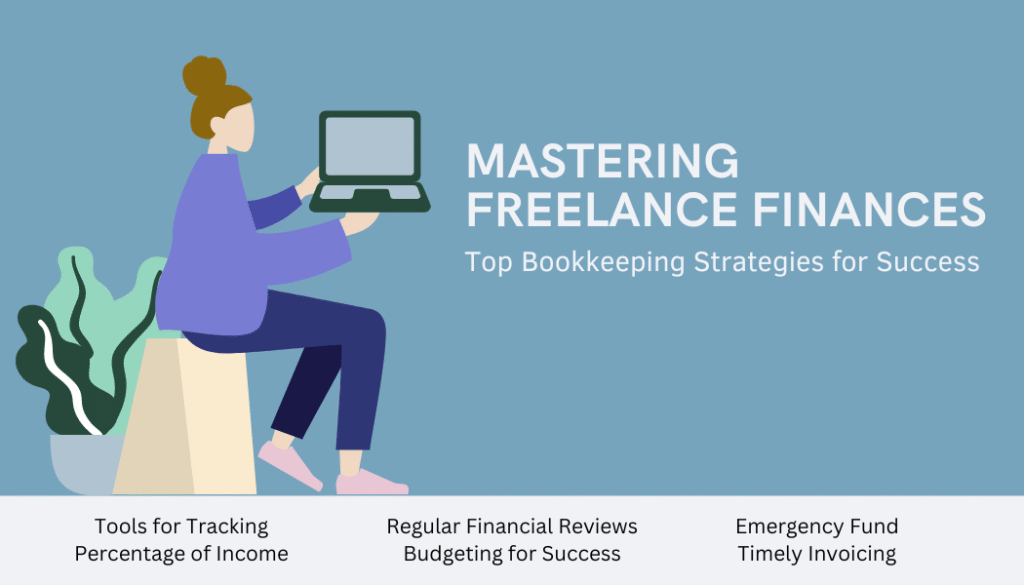
The freelance life offers freedom and flexibility but also brings the unique challenge of managing your own finances. Effective bookkeeping is crucial for success in the freelance world. It’s not just about keeping track of earnings and expenses; it’s about understanding the financial health of your business. In this detailed guide, we’ll explore top bookkeeping strategies to help freelancers master their finances and pave the way for a successful career.
Understanding the Importance of Good Bookkeeping
First, let’s establish why bookkeeping is so vital for freelancers:
- Financial Clarity: Good bookkeeping provides a clear picture of your financial position, helping you make informed decisions.
- Tax Preparation: It simplifies tax filing by keeping all your financial information organized and accessible.
- Budget Management: It aids in budget planning and ensures you are prepared for slow periods.
- Professional Reputation: Accurate bookkeeping reflects professionalism and can build trust with clients.
1. Separate Personal and Business Finances
- Opening a Business Account: Keep your personal and business finances separate by opening a dedicated business bank account.
- Benefits of Separation: This simplifies bookkeeping, aids in tax preparation, and presents a professional image to clients and lenders.
2. Track All Income and Expenses
- Documenting Every Transaction: Record every bit of income and every expense, no matter how small. This includes receipts, invoices, and bank statements.
- Tools for Tracking: Use bookkeeping software or apps designed for freelancers to streamline this process.
3. Understand Your Tax Obligations
- Research Tax Requirements: Understand what taxes you owe, including income tax and self-employment tax.
- Quarterly Tax Payments: Freelancers often need to make estimated tax payments quarterly. Stay on top of these deadlines to avoid penalties.
4. Regular Financial Reviews
- Weekly or Monthly Check-ins: Regularly review your financials to keep a pulse on your business’s health.
- Identify Trends: This can help you spot income trends, seasonality in your business, and areas where you can cut costs.
5. Set Aside Money for Taxes
- A Separate Tax Account: Consider setting up a separate savings account for taxes.
- Percentage of Income: Allocate a percentage of each payment you receive for tax purposes.
6. Create a Budget and Stick to It
- Budgeting for Success: Develop a budget that covers your business expenses, personal salary, and savings goals.
- Regular Adjustments: Adjust your budget as needed based on your income and expenditure patterns.
7. Invoice Promptly and Follow Up
- Timely Invoicing: Send invoices as soon as a job is completed. Delayed invoicing can lead to delayed payments.
- Follow-up on Late Payments: Don’t hesitate to follow up on overdue invoices. Cash flow is key in freelancing.
8. Plan for Slow Periods
- Emergency Fund: Save for periods when work may be scarce. An emergency fund can cover 3-6 months of expenses.
- Diversifying Income Streams: Consider diversifying your services or seeking passive income opportunities.
9. Use Technology to Your Advantage
- Bookkeeping Software: Invest in good bookkeeping software tailored for freelancers.
- Automate Where Possible: Use automation for tasks like invoicing, expense tracking, and payment reminders.
10. Consider Professional Help
- Hiring a Bookkeeper or Accountant: If finances aren’t your strong suit, consider hiring a professional. This can free up your time to focus on your core business.
11. Stay Educated and Adapt
- Continuous Learning: The financial landscape is ever-changing. Stay informed about best practices in freelancing and bookkeeping.
- Adaptable Strategies: Be ready to adapt your strategies as your business grows and changes.
Conclusion
Mastering freelance finances is not just about keeping records; it’s about developing a comprehensive strategy that covers all aspects of your financial health. Implement these strategies to stay on top of your finances, and you’ll find that it not only brings peace of mind but also sets the foundation for lasting success in your freelance career.
About the Author
Are you ready to take your freelance finances to the next level? James Wegener, the CEO of The QuickBooks Guy, LLC, is here to guide you every step of the way. With over 20 years of experience in bookkeeping and a deep understanding of financial software solutions, James is the go-to expert for businesses seeking to optimize their financial operations.
Don’t let bookkeeping challenges hold you back any longer. Reach out today at 678-923-5904 or drop an email to TheQuickBooksGuy@gmail.com.




